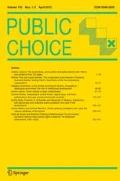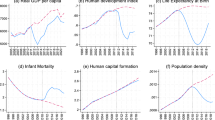Conclusions
The author attempting to analyze the interplay between politics and economics is faced with a large number of problems, ranging from an always too small and idiosyncratic data set to the lack of any generally accepted theory of the process which has testable implications. My aims have been (1) to show that past studies have typically treated inflation in an extremely naive way, disregarding the fact that it may have political pluses if unanticipated, and (2) to test the sensitivity of established formulations to what I believe is the more useful view of voter behavior given in Model II. Since Model I and Model II represent polar extremes of amnesiac and eidetic behavior, tests of intermediate lag structures are clearly in order. Because of administration peculiarities, however, lost data points will pose a serious problem.
Next on the research agenda is a look at the process by which the electorate forms its expectations and evaluations. Do events of the recent past indicate that administrations have lost the ability to ‘fool’ people with fiscal and monetary policies because the public's expectations have been rationally formulated? (McCallum, 1977) If so, then there will be a lower likelihood that a president can successfully control his popularity by using monetary and fiscal policies. Or is the recent past an odd slice of history in which external events have temporarily eclipsed the administration's power to control the economy? If so, then the next few decades of data will be well worth examining.
Similar content being viewed by others
References
Alchian, A.A., and Kessel, R. (1962). Effects of inflation. Journal of Political Economy 70 (December): 521–537.
Alchian, A.A., and Kessel, R. (1960). The meaning and validity of the inflation-induced lag of wages behind prices. American Economic Review (March): 43–66.
Arcelus, F., and Meltzer, A.H. (1975). The effect of aggregate economic variables on congressional elections. American Political Science Review 69 (December): 1232–1239.
Bach, G.L., and Stephenson, J.B. (1974). Inflation and the redistribution of wealth. Review of Economics and Statistics 56 (February): 1–13.
Barro, R.J. (1977). Unanticipated money growth and unemployment in the United States. American Economic Review 67 (March): 101–115.
Buchanan, J., and Wagner, R.E. (1977). Democracy in deficit. New York: Academic Press.
Crain, W.M., Deaton, T.M., and Tollison, R.D. (1978). Macroeconomic determinants of the vote in presidential elections. Public Finance Quarterly 6 (October): 427–438.
Fair, R.C. (1978). The effect of economic events on votes for President. Review of Economics and Statistics 60 (May): 159–173.
Frey, B.S., and Schneider, F. (1978). An empirical study of politico-economic interaction in the United States. Review of Economics and Statistics 60 (May): 174–183.
Gordon, R.J. (1977). Macroeconomics. Boston: Little Brown.
Hibbs, D.A. (1974). Problems of statistical estimation and causal inference in dynamic, time-series regression models. In H.L. Costner (Ed.), Sociological methodology 1973–74. San Francisco: Jossey-Bass.
Kenski, H.C. (1977). The impact of economic conditions on presidential popularity. Journal of Politics 39 (August): 764–773.
Kernell, S. (1978). Explaining presidential popularity. American Political Science Review 72 (June): 506–522.
Kramer, G. (1971). Short-term fluctuations in U.S. voting behavior, 1896–1964. American Political Science Review 65 (March): 131–143.
Lucas, R.E., Jr. (1972). Expectations and the neutrality of money. Journal of Economic Theory 4 (April): 103–124.
MacRae, C.D. (1977). A political model of the business cycle. Journal of Political Economy 85 (April): 239–264.
McCallum, B.T. (1977). The political business cycle: An empirical test. Southern Economic Journal 71 (May): 202–218.
Mueller, J.E. (1970). Presidential popularity from Truman to Johnson. American Political Science Review 64 (March): 18–34.
Nordhaus, W.D. (1975). The political business cycle. Review of Economic Studies 42 (April): 169–190.
Parks, R.W. (1978). Inflation and relative price variability. Journal of Political Economy 86 (February): 79–96.
Stigler, G.J. (1973). General economic conditions and national elections. American Economic Review 63 (May): 160–167.
Tufte, E.R. (1978). Political control of the economy. Princeton: Princeton University Press.
Vining, D.R. Jr., and Elwertowski, T.C. (1976). The relationship between relative prices and the general price level. American Economic Review 66 (September): 699–708.
Author information
Authors and Affiliations
Rights and permissions
About this article
Cite this article
Michaels, R. Reinterpreting the role of inflation in politico-economic models. Public Choice 48, 113–124 (1986). https://doi.org/10.1007/BF00179726
Issue Date:
DOI: https://doi.org/10.1007/BF00179726




